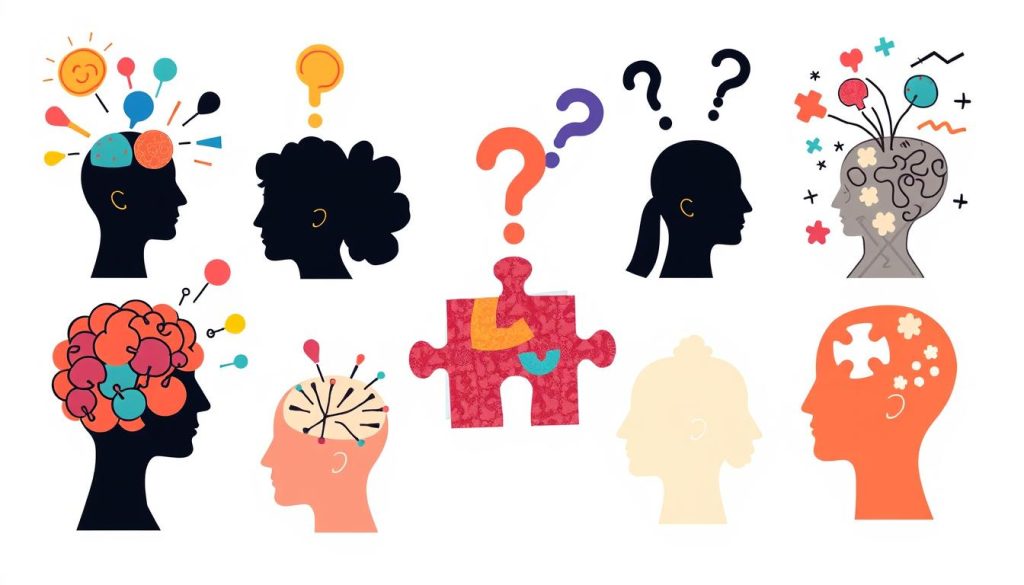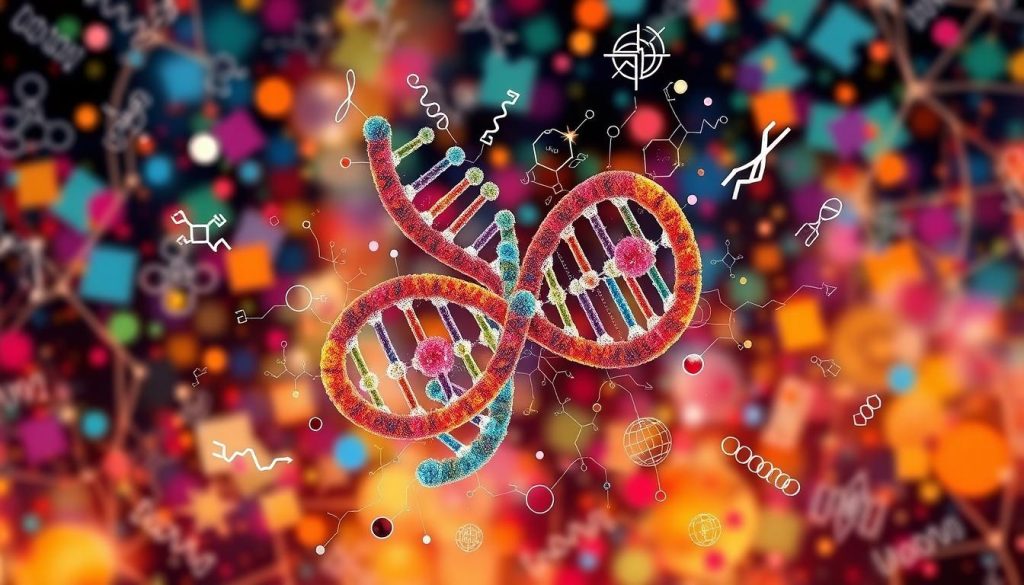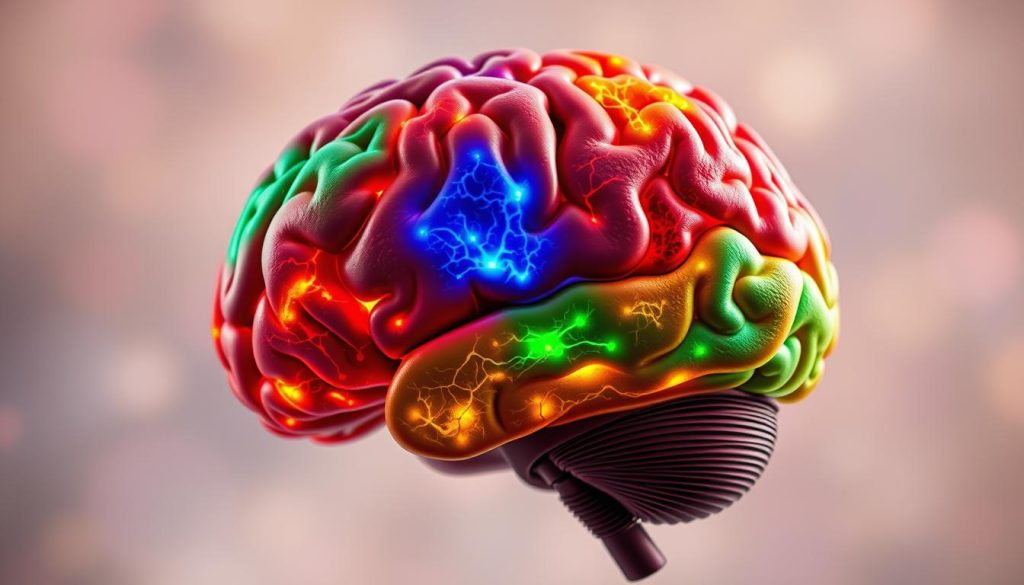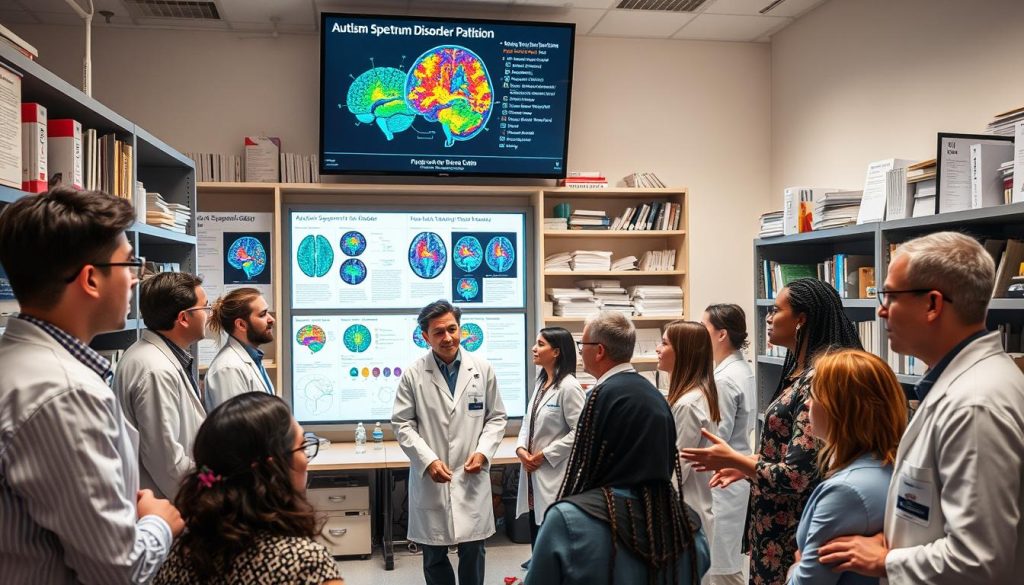Autism spectrum disorder (ASD) is a complex condition that affects millions globally. Many wonder if you can develop autism later in life or if it’s present from birth. This question leads us to explore the nature of autism, its causes, and how it’s diagnosed.
Autism is not a condition that suddenly appears in adulthood. It’s typically present from early childhood, though signs may not be recognized until later. Understanding the autism spectrum is key to grasping its lifelong impact and the importance of early intervention.
As we explore this topic, we’ll look at the latest research on autism causes and diagnosis. Our goal is to provide clear, factual information. This will help you better understand this complex condition and its effects on individuals and families.
Understanding Autism Spectrum Disorder (ASD): A Comprehensive Overview
Autism spectrum disorder is a complex condition that affects how people interact and communicate. It also impacts their behavior. This overview will cover the key aspects of ASD, its characteristics, and how our understanding has grown over time.
Defining Autism Spectrum Disorder
ASD is a lifelong condition that usually shows up in early childhood. It makes social interaction, communication, and certain behaviors challenging. The term “spectrum” shows the wide range of symptoms and their intensity in different people.
The Spectrum of Autism Characteristics
Autism symptoms vary greatly from person to person. Some common signs include:
- Difficulty with social interactions
- Challenges in verbal and nonverbal communication
- Repetitive behaviors or restricted interests
- Sensory sensitivities
Historical Understanding vs. Modern Research
Our understanding of autism has changed a lot over the years. Early theories blamed parenting styles, but now we focus on genetic and environmental factors. Today, we see ASD as a complex neurodevelopmental condition with many factors at play.
| Past Understanding | Current Knowledge |
|---|---|
| Single condition | Spectrum of disorders |
| Rare disorder | More common than previously thought |
| Caused by parenting | Influenced by genetic and environmental factors |
| Limited treatment options | Various interventions and support strategies available |
Can You Develop Autism: Addressing Common Misconceptions
Many people ask, “Can you develop autism?” This question comes from misunderstandings about autism spectrum disorder (ASD). Let’s debunk some myths and share the truth about when autism starts.

Autism isn’t something that shows up in adulthood. It’s a brain disorder that exists from birth, even if signs aren’t clear until later. The terms late-onset autism and acquired autism are wrong. What really happens is a late discovery of the condition, not a new development.
Here are some important points to remember:
- Autism is present from early brain development
- Signs may become more apparent as a child grows
- Adults can receive a first-time diagnosis
- Environmental factors don’t cause autism after birth
It’s vital to clear up myths about autism causes and. Knowing the truth helps us better support people with ASD.
| Myth | Fact |
|---|---|
| Vaccines cause autism | No scientific evidence supports this claim |
| Bad parenting leads to autism | Autism is a neurodevelopmental condition |
| Adults can suddenly develop autism | Autism is present from early childhood |
Knowing autism can’t be developed later in life is key. It guides us to focus on early detection, support, and acceptance of neurodiversity all through life.
Early Signs and Indicators of Autism in Children
Spotting autism symptoms early is key to getting a diagnosis and help. Parents and caregivers are vital in noticing these signs. Let’s look at some key signs that might mean a child is at risk for autism.
Social Communication Markers
Children with autism often have unique social behaviors. They might not make eye contact or respond when called by name. They might not point at things or share interests. These social challenges are important signs to watch for.
Behavioral Patterns to Watch For
Certain behaviors can hint at autism risk. These include repetitive actions like hand-flapping or rocking. Some kids might line up toys or get upset by changes. Unusual reactions to sounds or textures are also signs.
Developmental Milestones and Red Flags
Delays in reaching milestones can be autism red flags. This includes late talking, no babbling by 12 months, or no single words by 16 months. If a child loses skills they once had, it’s time to seek a diagnosis. Early detection is critical for a child’s development and support.
- No big smiles or joyful expressions by 6 months
- No back-and-forth sharing of sounds or facial expressions by 9 months
- No gestures like pointing or waving by 12 months
- No meaningful two-word phrases by 24 months
Genetic Factors and Hereditary Risks in Autism
Autism spectrum disorder has complex roots in genetics. Research shows that certain genes play a role in autism causes. Family history is a key risk factor for autism. If a sibling has autism, the chances of another child having it increase.
Scientists have found many genes linked to autism. Some affect brain development. Others impact how nerve cells talk to each other. No single gene causes autism on its own. It’s a mix of genetic changes that raises the risk.

Studies of twins reveal the genetic nature of autism. Identical twins often both have autism if one does. This happens less with fraternal twins. It shows genes matter a lot in autism risk.
Parents may worry about passing autism to their kids. The risk is there, but it’s not certain. Many factors affect if a child develops autism. Genes are just one piece of the puzzle.
| Relation to Person with Autism | Increased Risk |
|---|---|
| Identical Twin | 36-95% |
| Fraternal Twin | 0-31% |
| Sibling | 2-18% |
| Child of Parent with Autism | Up to 50% |
Genetic testing can help families understand their risk. But it can’t predict autism for sure. Doctors use it with other tools to diagnose autism spectrum disorder. As research grows, we learn more about the genetic side of autism.
Environmental Influences and Autism Development
Researchers are looking into how the environment affects autism. While genes are important, outside factors might also play a role. Let’s look at some environmental factors linked to autism.
Prenatal Risk Factors
Some conditions during pregnancy can raise autism risk. This includes infections, certain medicines, and older parents. Getting good prenatal care can help lower these risks.
Early Childhood Environmental Exposures
The first years of life are key for brain growth. Research shows that early exposure to some substances can affect autism risk. These include air pollutants, pesticides, and chemicals that mess with hormones.
The Role of Toxins and Pollutants
Concerns about toxins and pollutants in autism research are growing. Studies link heavy metals, industrial chemicals, and air pollution to higher autism risk. Cutting down on these harmful substances might help prevent autism.
| Environmental Factor | Potential Impact on Autism Risk |
|---|---|
| Maternal Infections | May increase risk during pregnancy |
| Air Pollution | Linked to higher autism rates in urban areas |
| Pesticides | Exposure may affect brain development |
| Heavy Metals | Can interfere with neurological processes |
It’s important to understand these environmental factors to tackle autism causes. By reducing exposure to risk factors, we might lower autism rates in the future.
The Truth About Late-Onset Autism Diagnosis
Many people ask, “Can you develop autism later in life?” The answer is no. Autism is a condition present from birth. But, late-onset autism diagnosis is real and common. This happens when signs of autism are missed until someone is in their teens or twenties.

Late autism diagnosis often occurs because symptoms can be subtle or hidden. Some people learn to hide their differences, making it hard to detect. As life gets busier, autism traits become more obvious, leading to a diagnosis.
Several factors contribute to late-onset autism diagnosis:
- Improved awareness and diagnostic criteria
- Better access to mental health services
- Increased social pressures revealing autistic traits
- Recognition of autism in females, who often present differently
It’s important to know that a late autism diagnosis doesn’t mean the condition developed recently. It shows a delay in recognizing traits that were there all along. Getting an autism diagnosis at any age can offer valuable insights and support for those living with autism.
Adult Autism: Recognition and Diagnosis
It’s hard to spot autism in adults. Many don’t get diagnosed until they’re grown up. This can cause a lot of confusion and frustration. It’s important to know the signs and how to get diagnosed if you think you might have autism.
Signs of Autism in Adults
Adults with autism might show these signs:
- Having trouble with social interactions
- Being really into certain things
- Being very sensitive to sounds, sights, and smells
- Following strict routines or behaviors
Diagnostic Process for Adults
Getting diagnosed as an adult involves a few steps:
- Answering self-assessment questionnaires
- Meeting with specialists for a detailed evaluation
- Looking back at your developmental history
- Watching how you behave and communicate
Coping Strategies and Support
After you get diagnosed, there are ways to get help:
- Trying cognitive behavioral therapy
- Learning social skills
- Getting help from occupational therapy
- Joining support groups for adults with autism
Accepting your autism diagnosis can really help you understand yourself better. With the right support and strategies, adults with autism can do well in their personal and work lives.
The Role of Brain Development in Autism
Brain development is key in autism spectrum disorder. Studies show people with autism have unique brain differences. These differences can lead to autism’s characteristics.

Research finds kids with autism have bigger brain areas early on. This growth might start autism symptoms. The extra growth affects areas for social skills and talking.
There are also brain connection differences in autism. These changes affect how the brain shares information. They might explain some autism challenges.
Knowing these brain differences is vital for finding autism risks. It helps in making better tests and treatments. By studying brains, scientists aim to help people with autism all their lives.
- Larger brain volumes in specific areas
- Differences in brain connectivity
- Impact on information processing
More research is needed to understand these brain differences. This could lead to new ways to treat autism. It’s a step towards helping those with autism spectrum disorder.
Debunking Myths About Vaccines and Autism
The debate about vaccines and autism has been intense. Let’s look at the scientific facts and why this myth keeps coming up.
Scientific Research and Evidence
Many studies have shown no link between vaccines and autism. Research on autism causes has found that vaccines don’t raise the risk of autism spectrum disorder. A big study with over 650,000 kids found no connection between the MMR vaccine and autism.
Scientists have checked many environmental factors for autism. They’ve looked at things like prenatal exposures and early childhood experiences. But they’ve found no link to vaccines.
Understanding the Origin of Vaccine Concerns
The myth started with a 1998 study that was later proven wrong. This study claimed a link between the MMR vaccine and autism. But it was found to be fake, and the author lost his medical license.
Even though the study was retracted, it scared a lot of people. It led to fewer vaccinations and more outbreaks of diseases. Today, scientists keep studying autism, looking at genetics and early brain development.
It’s important to trust scientific sources when talking about autism causes. Vaccines are safe and don’t cause autism. Parents worried about autism should talk to doctors about real risks.
Current Research on Autism Development
Scientists are making big strides in understanding autism spectrum disorder. Recent studies have shed light on what causes autism and how the environment plays a role. This research is helping to create better support and treatments for those with autism.
Latest Scientific Discoveries
New findings show that genes and the environment interact in complex ways in autism development. Researchers have found specific genetic markers that increase the risk of autism. Brain imaging studies have also shown differences in neural connections in people with autism spectrum disorder.

A groundbreaking study found that early intervention can greatly improve outcomes for children with autism. This study highlights the importance of early diagnosis and tailored support.
Ongoing Studies and Future Directions
Current research is focused on several key areas:
- Identifying biomarkers for early autism detection
- Exploring gene-environment interactions in autism development
- Developing personalized interventions based on individual profiles
- Investigating environmental risk factors during pregnancy and early childhood
| Research Area | Potential Impact |
|---|---|
| Genetic mapping | Earlier diagnosis and targeted treatments |
| Environmental studies | Prevention strategies and risk reduction |
| Brain connectivity research | New therapies to improve social communication |
| Microbiome studies | Dietary interventions for symptom management |
These ongoing studies promise to deepen our understanding of autism spectrum disorder. They aim to lead to improved support for individuals and families affected by autism.
Prevention Strategies and Risk Reduction
Understanding what causes autism is key to preventing it. We can’t stop autism from happening, but we can lower the risk. This helps in promoting healthy growth in children.
Prenatal care is very important in fighting autism risks. Pregnant women should stay away from harmful substances. They should also eat well, with lots of folic acid and omega-3 fatty acids.
Early action is essential in dealing with autism causes. Regular checks can spot signs early. This means we can start support and therapy right away.
Here are some proven ways to lower autism risks:
- Avoid alcohol and tobacco during pregnancy
- Maintain a healthy weight before and during pregnancy
- Ensure proper nutrition and prenatal vitamin intake
- Minimize exposure to air pollution and pesticides
- Manage stress levels during pregnancy
Some things might help protect against autism:
| Protective Factor | Potential Benefit |
|---|---|
| Folic acid supplementation | May reduce autism risk by up to 40% |
| Optimal birth spacing | Pregnancies spaced 2-5 years apart show lower autism risk |
| Maternal omega-3 intake | Associated with improved cognitive development |
| Breastfeeding | May offer protective effects against autism |
By taking these steps, we can lower autism risks. This helps in making sure children grow up healthy.
Support Systems and Resources for Individuals with Autism
Living with autism spectrum disorder can be tough. But, there are many support systems and resources to help. These include professional help, community networks, and educational tools.
Professional Help Options
People with autism can get help from therapists, psychologists, and psychiatrists. They offer behavioral therapy, cognitive training, and medication management when needed. Telehealth services are also available, making it easier for adults with autism to get care.
Community Support Networks
Community support is very important for those with autism. Local support groups let people share experiences and strategies. They also have social events, workshops, and informational sessions.
Online forums and social media groups offer support too. They connect people from all over.
Educational Resources
Learning about autism is key for adults with the condition. Many organizations provide free online courses and webinars. Libraries and community centers have books and multimedia on autism.
Universities and research centers publish new findings. This helps people stay updated on autism research and treatments.
| Resource Type | Examples | Benefits |
|---|---|---|
| Professional Help | Therapists, Psychologists | Personalized treatment plans |
| Community Support | Local groups, Online forums | Peer support, Shared experiences |
| Educational Resources | Online courses, Books | Up-to-date information, Self-learning |
Living with Autism: Adaptation and Acceptance
Living with autism spectrum disorder (ASD) comes with its own set of challenges and chances. Many adults with autism find ways to adapt to a world that can feel too much. They deal with sensory issues, social interactions, and routines, but with the right support, they can do well.
Acceptance is key to creating a positive space for those with ASD. Seeing autism as a natural part of human brain function helps reduce stigma. It also promotes inclusivity. For those with autism, accepting themselves is just as important. It helps them focus on their strengths, not weaknesses.
Adapting to autism looks different for everyone. Some use visual schedules, headphones, or apps to manage their day. Others might benefit from occupational therapy or social skills groups. The aim is to find what works best for each person.
Having a supportive network is vital for those with autism. This includes family, friends, healthcare providers, and community groups. With the right support and a focus on personal growth, people with autism can lead happy, fulfilling lives. They can pursue their passions and make a real difference in the world.
FAQ
Q: Can you develop autism later in life?
A: No, you can’t develop autism later in life. Autism spectrum disorder (ASD) starts in early childhood. Even if it wasn’t recognized earlier, the signs of autism are there from the start.
Q: What are the main causes of autism?
A: The exact causes of autism are not fully understood. Research shows it’s a mix of genetic and environmental factors. Genetic predisposition is a big factor, and some environmental influences may also play a role.
Q: How is autism diagnosed?
A: Diagnosing autism involves a detailed evaluation. This includes observing behavior, reviewing medical history, and using specific tools. Specialists like psychologists and speech therapists are part of the team.
Q: What are the early signs of autism in children?
A: Early signs of autism in children include:
– Limited or no eye contact
– Delayed speech or language skills
– Repetitive behaviors or movements
– Difficulty with social interactions
– Intense interest in specific topics
– Sensitivity to sensory stimuli
These signs can vary among individuals.
Q: Can adults be diagnosed with autism?
A: Yes, adults can be diagnosed with autism. Many people, with milder forms, get diagnosed as adults. This is due to better awareness and diagnostic criteria. An adult diagnosis can help access support services.
Q: Is there a link between vaccines and autism?
A: No, vaccines do not cause autism. This myth was debunked by large-scale studies. The scientific consensus is that vaccines are safe and do not increase autism risk.
Q: Can autism be prevented?
A: There’s no known way to prevent autism entirely. But, early intervention and support can greatly improve outcomes. Some research suggests prenatal care and reducing toxins may help, but more studies are needed.
Q: How does autism affect adults?
A: Autism can impact various areas of life for adults. This includes social relationships, employment, and independent living skills. But, with support, many adults with autism lead fulfilling lives.
Q: Are there different types of autism?
A: Autism was once categorized into subtypes. Now, it’s called autism spectrum disorder (ASD). This approach recognizes the unique strengths and challenges of each individual.
Q: What resources are available for individuals with autism and their families?
A: Many resources are available, including therapy services and educational support. There are also support groups, vocational training, and advocacy organizations. It’s best to consult with healthcare providers and local autism organizations for specific resources.


















